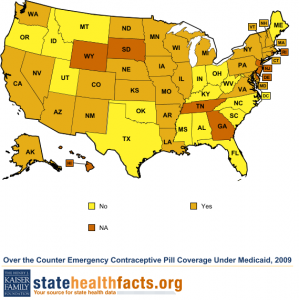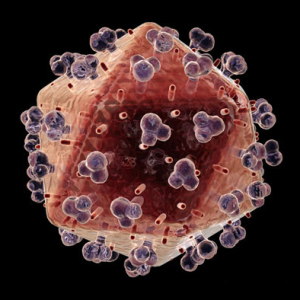Human Immunodeficiency Virus (HIV) damages the white blood cells of the immune system, reducing the body’s ability to fight off bacterial infection, viruses, and other diseases such as pneumonia and some cancers. Late stage HIV is often referred to as Acquired Immunodeficiency Syndrome (AIDS).
The most common causes of HIV infection are through sexual contact, infected blood transfusion, or sharing needles or syringes. HIV symptoms vary with the phase of infection. Early symptoms may resemble a flu virus, but infected individuals may show no symptoms for eight or nine years. Later symptoms include swollen lymph nodes, weight loss, fever, and diarrhea. Advanced HIV and AIDS symptoms are more severe and include night sweats, chills, fever, lesions or white spots in the mouth, headache and chronic diarrhea. Treatment for HIV involves an array of anti-retroviral medications, coordinated to each individual’s response. New treatments are continually being developed and tested in clinical trials.
Resources at Northwestern for HIV:
The HIV Center at Northwestern Memorial Hospital offers comprehensive assessment and treatment for HIV. The Center offers services such as patient/family education, medication instruction, clinical trials, medical and legal referrals and an infusion center. Within the HIV Center there are specialty clinics for patients needing care in medical areas of hepatology, neurology, ophthalmology and hematology, and also in obstetrics and gynecology. Inpatient hospital care is also provided with an interdisciplinary approach to disease treatment.
For more information contact: (312) 926-8358
Northwestern Physicians/ Researchers specializing in HIV treatment:
The Division of Infectious Disease at Northwestern’s Feinberg School of Medicine offers inpatient and outpatient services for the diagnosis and treatment of HIV and other infectious diseases. The Division’s 9 full-time faculty members all receive external grants for basic science and clinical research projects. Dr. Sarah Sutton’s research interests include perinatal transmission of HIV, and HIV and women, while Dr. Steven Wolinsky, the Division Chief, studies the evolutionary mechanisms at work in the emergence, spread and containment of diseases such as HIV.
Click to see physician profiles and clinic information:
https://www.nmff.org/findPhysician/physearch.asp
https://www.nmff.org/ClinicalMedical/department.asp?id=21
IWHR Highlighted Researcher
Dr. Kimberly Scarsi, PharmD, MSc is a Research Assistant Professor in the Division of Infectious Disease at Northwestern University. Her research focuses on the pharmacokinetics of HIV treatment in women, particularly during pregnancy. Dr. Scarsi's research recognizes the need for studies in women since previous research has been conducted primarily in men. Dr. Scarsi is studying the fluctuation in antiviral concentrations during pregnancy, toward the goal of treating these women more efficiently. She is also comparing results of her studies in the US with sister studies in Africa, where nearly 60% of those infected with HIV are women. Recently Dr. Scarsi was chosen as a recipient of an Institute for Women's Health Research Pioneer Grant for the establishment of a long-term database of women in which she will be doing single-timed blood samples over the course of their pregnancy. She hopes to pinpoint the changes that occur in the second and third trimesters so that physicians may adjust dosages accordingly. Eventually the project may become a multicenter study in the US and internationally.
Useful Links and Resources:
http://www.cdc.gov/hiv/
http://www.webmd.com/hiv-aids/default.htm
http://www.nmac.org/index
http://www.hiv.com/



